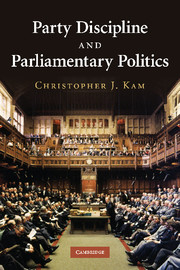Book contents
- Frontmatter
- Contents
- List of figures
- List of tables
- Acknowledgements
- 1 Introduction
- 2 A model of intra-party politics
- 3 Patterns of backbench dissent in four Westminster parliamentary systems, 1945–2005
- 4 Policy preferences and backbench dissent in Great Britain and Canada
- 5 Dissent, constituency service, and the personal vote in Great Britain and New Zealand
- 6 The cost of dissent to the party
- 7 Demotion and dissent in the Canadian Liberal Party, 1991–1997
- 8 Discipline and dissent in the Australian Coalition, 1996–1998
- 9 Career trajectories, socialization, and backbench dissent in the British House of Commons
- 10 Conclusion
- Appendix 1 Comparative statics and proofs
- Appendix 2 Content and construction of ideological scales
- Appendix 3 Sampling and coding of media dissent and discipline
- Appendix 4 Demotion and the parliamentary careers of Canadian MPs
- References
- Index
10 - Conclusion
Published online by Cambridge University Press: 03 July 2009
- Frontmatter
- Contents
- List of figures
- List of tables
- Acknowledgements
- 1 Introduction
- 2 A model of intra-party politics
- 3 Patterns of backbench dissent in four Westminster parliamentary systems, 1945–2005
- 4 Policy preferences and backbench dissent in Great Britain and Canada
- 5 Dissent, constituency service, and the personal vote in Great Britain and New Zealand
- 6 The cost of dissent to the party
- 7 Demotion and dissent in the Canadian Liberal Party, 1991–1997
- 8 Discipline and dissent in the Australian Coalition, 1996–1998
- 9 Career trajectories, socialization, and backbench dissent in the British House of Commons
- 10 Conclusion
- Appendix 1 Comparative statics and proofs
- Appendix 2 Content and construction of ideological scales
- Appendix 3 Sampling and coding of media dissent and discipline
- Appendix 4 Demotion and the parliamentary careers of Canadian MPs
- References
- Index
Summary
Summary
This book has been about the relationship between leaders of parliamentary parties and their MPs, how the two sides interact and sometimes clash. The LEADS model provides a comprehensive framework for understanding how the incentives and objectives of both leaders and MPs come together in a particular manner to produce either loyalty and unity or dissent and disunity. In the model ideological disagreements and electoral pressures (i.e., differences in electoral environments across constituencies) set the stage for dissent to occur. Leaders have several means of controlling their MPs' dissension, but I argue that in the main, leaders take advantage of their MPs' progressive ambitions and their control of parliamentary career channels to maintain unity. While this strategy is effective in the medium term, there comes a point when the MP can no longer be promoted, and the lure of advancement loses its capacity to constrain the MP's behaviour. Yet dissent does not necessarily surge at this point in MPs' careers. Why not? One reason is that party leaders turn to discipline to maintain unity. Discipline is costly, however, and hence I end by arguing that socialization fills the void. MPs internalize norms of party loyalty, and over time these norms help to constrain their behaviour, limiting their propensity to dissent even after their career prospects have declined.
This is an overtly synthetic model of intra-party politics, drawing on several theoretical approaches to legislative behaviour.
- Type
- Chapter
- Information
- Party Discipline and Parliamentary Politics , pp. 205 - 210Publisher: Cambridge University PressPrint publication year: 2009

